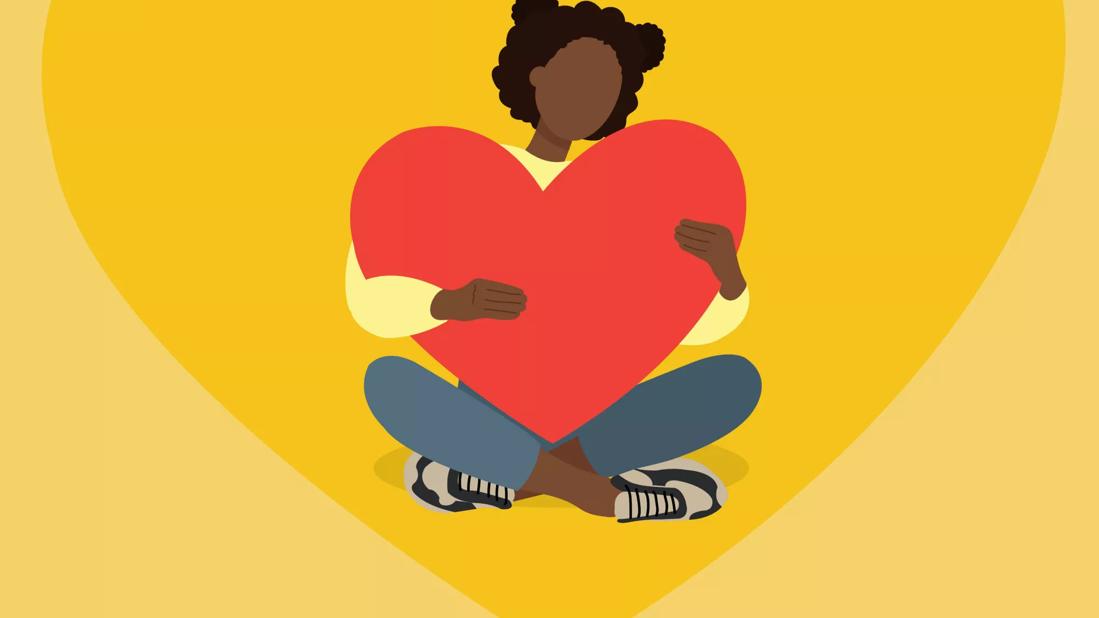Silence your inner critic by treating yourself with kindness, understanding and empathy

“I really blew that work presentation.”
Advertisement
Cleveland Clinic is a non-profit academic medical center. Advertising on our site helps support our mission. We do not endorse non-Cleveland Clinic products or services. Policy
“I hate how I look in this dress.”
“I’m so mad that I ate that pint of ice cream.”
“I’m so stupid. Why did I say that?”
If this were a friend or a family member venting to you, you’d offer empathy, compassion and understanding. But many times, when these negative thoughts are in our own heads and directed at ourselves, we struggle to give ourselves the same kindness we extend to others.
Instead of being tough on ourselves, we could all do a better job of practicing self-compassion. Self-compassion is the idea of being as kind and caring to yourself as you would be to others.
Registered psychotherapist Natacha Duke, RP, explains the concept behind self-compassion and offers techniques on how to practice self-compassion.
“Self-compassion is about treating yourself the way you treat your close friends,” explains Duke. “It’s really about being kind and gentle with yourself and directing compassion inward.”
So, how is this different from self-esteem? They’re closely related. When it comes to self-esteem, research shows that it often ebbs and flows and isn’t a consistent construct.
“Part of the reason that happens is because self-esteem is often based on comparison — somebody might feel better about themselves in one area compared to other people,” Duke further explains. “With self-compassion, what research shows is that when someone begins to cultivate self-compassion and starts to practice using that muscle, it’s a more consistent construct over time. It’s not based on comparing yourself to anybody else.”
Advertisement
The concept of self-compassion isn’t without criticism or misconceptions. Some people view it as self-pity or a way to feel sorry for yourself.
“This comes up a lot when I introduced the idea of self-compassion to people — and it couldn’t be further from the truth,” states Duke. “Self-compassion isn’t about having blinders. It’s about being able to understand that falling down, having difficulty and experiencing suffering are all part of humanity. It’s about meeting those feelings with kindness, gentleness and love — and really accepting them.”
That doesn’t mean self-compassion can’t help you change and let you wallow in your feelings of self-doubt.
“In fact, self-compassion is about opening up space for change,” clarifies Duke. “It’s this dichotomy of being able to accept your situation, meet yourself with kindness and then create space for learning from the situation without harsh criticism.”
That means being able to forgive ourselves, accept our flaws and show ourselves kindness. Easy, right?
About 20 years ago, psychologist Kristin Neff began to research the idea of self-compassion.
“What she found is that one of the greatest ways that we can build resiliency and actually improve our mental well-being is through self-compassion,” says Duke. “So, instead of meeting setbacks with our internal critic, by starting to cultivate compassion, we can actually bounce back faster, we can suffer less depression, less anxiety, less rumination, and it can even help us to meet our goals and increase our motivation for a wide range of goals.”
So, self-compassion can be a useful tool in reaching our goals, even if we “fail” a few times along the way.
There are three components of self-compassion:
Advertisement
There are different ways we can cultivate self-compassion. Duke offers the following self-compassion exercises:
It may sound silly, but Duke says to write a letter to yourself from the perspective of your closest friend and what you imagine they’d say to you.
“This helps you practice compassionate dialogue,” says Duke. “At first, it may be tough to do. You’re probably not used to talking to yourselves in that way when something doesn’t go well.”
Here are some examples of self-compassion statements:
The idea is that over time, you’ll become familiar with speaking empathically to yourself and become more comfortable with the idea of being compassionate to yourself.
Here’s an easy technique to use when you’re getting down on yourself.
“Start by putting your hand on your heart,” instructs Duke. “This has been found to release oxytocin, which is a very calming hormone. And as you’re doing that, acknowledge to yourself either out loud or quietly to yourself that you’re going through a really difficult time. And tell yourself that it’s OK to have those difficult feelings, it’s OK to be going through this difficult time and it’s OK if this is hard for you.”
Advertisement
You want to focus on breathing during this and allow space for your breathing without trying to change anything. Even five or 10 minutes of deep breathing has benefits.
“You also want to take the time to ask yourself what you need,” notes Duke. “What do you need to feel a little bit better right now? What do you need to get back to your equilibrium? Do you need to go for a walk? Do you need to speak to your mom? Do you need to get yourself a coffee? What do you need to even just move the pendulum a little bit?”
Then, when you start to feel a bit better, you can start to think about how to problem-solve without criticizing yourself.
“You want to start to problem-solve from a place of love and kindness,” encourages Duke.
You may or may not know about meditation. While it can come in many forms, it’s a way to calm your mind and help you stay present in the moment.
And there are some apps and websites that focus on self-compassion meditation. Many are guided meditations that can last anywhere from five minutes to 30 minutes.
“This can help someone understand how to cultivate that self-compassionate muscle,” says Duke. “It gives an example of what a self-compassionate voice might sound like. It can help you pay attention to your inner dialogue.”
Advertisement
You’ll focus on your breathing, letting your mind wander, and then repeating self-compassionate phrases like, “May I be kind to myself.”
As you become more comfortable with self-compassion, you may want to graduate to keeping a self-compassion journal.
“You want to write about any difficult situations that are happening right now,” says Duke. “Then, you want to ask and answer questions like: How can I be more mindful?”
Life is hard. And while you might be used to criticizing yourself when something goes wrong or if there’s a goal you want to achieve, it may be worth giving self-compassion a try.
“Though that criticism might help you be successful, it’s only for a small amount of time,” cautions Duke. “If you want long-term success and long-term emotional well-being, motivating yourself from a place of criticism is a recipe for disaster.”
Duke says you’re more likely to procrastinate and it can create issues like resentment, anger, anxiety, depression and insomnia.
“Think about it this way: A child falls off their bike. If you criticize them, they’re not going to want to get back on their bike because they have this fear of failure,” illustrates Duke. “But if you practice compassion with them and talk about how it can be hard to ride a bike, that opens up space for them to want to try again. With self-compassion, it’s almost like working with your inner child.”
Learn more about our editorial process.
Advertisement

A little research can go a long way — but only if you keep your mind open and your provider informed

Move your body, spend time with other adults and practice gratitude to help regain your sense of self

Like being your own best friend in times of trouble, self-love is an act of self-preservation

This state of mind is all about focusing on what you love and enjoy (minus the FOMO)

You may need a mental shift to start caring for your physical and mental well-being

Take time to prioritize yourself, even (especially) when you’re consumed with prioritizing others

Being occasionally self-indulgent has mental and physical benefits

Silence that mean voice in your head by treating yourself with gentle care and respect

Wearing a scarf, adjusting your outdoor activities and following your asthma treatment plan can help limit breathing problems

Your diet in the weeks, days and hours ahead of your race can power you to the finish line

When someone guilt trips you, they’re using emotionally manipulative behavior to try to get you to act a certain way